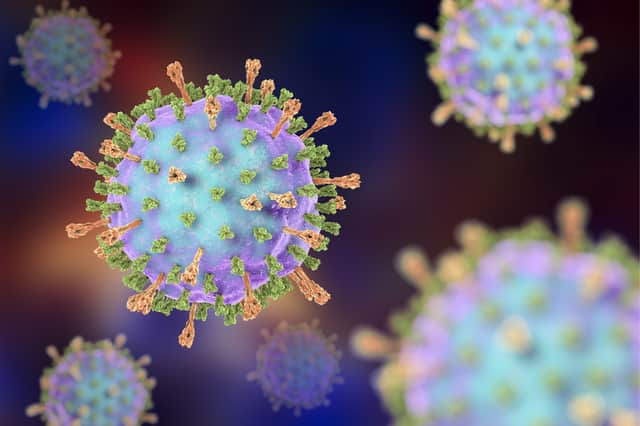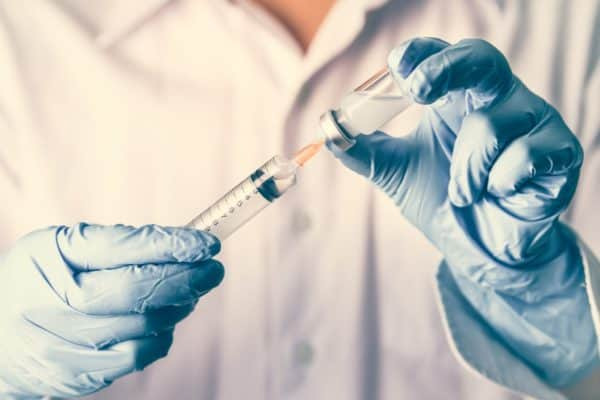Cases of mumps are at an all time high - here are the symptoms and everything about the MMR vaccine


Mumps is a contagious viral infection, which used to be common in children before the MMR vaccine was introduced. Cases of mumps in England have now reached their highest level in a decade, with health officials urging people to have both parts of the MMR vaccine.
But what are the most common signs and symptoms of this condition, can you get it more than once, and when should you get the vaccine?
Here’s everything you need to know.
Advertisement
Hide AdAdvertisement
Hide Ad

What are the symptoms of mumps?
The NHS notes that, “Mumps is most recognisable by the painful swellings in the side of the face under the ears (the parotid glands), giving a person with mumps a distinctive "hamster face" appearance.”
Other symptoms of mumps include:
headachesjoint paina high temperature - which may develop a few days before the swelling of the parotid glands
When should I see a doctor?
If you suspect you or your child may have mumps, it's important to contact a GP so a diagnosis can be made.Although mumps is not usually serious, the condition has similar symptoms to more serious types of infection, such as glandular fever and tonsillitis.The NHS said, “Your GP can usually make a diagnosis after seeing and feeling the swelling, looking at the position of the tonsils in the mouth and checking the person's temperature to see if it's higher than normal.”
You should let your GP know in advance if you're coming to the surgery so they can take any necessary precautions to prevent the spread of infection.
Advertisement
Hide AdAdvertisement
Hide AdThe full course of MMR vaccination requires two doses (Photo: Shutterstock)
How is mumps treated?
There's currently no cure for mumps, but the infection should pass within one or two weeks.
Treatment used to relieve symptoms includes:
getting plenty of bed rest and fluidsusing painkillers, such as ibuprofen and paracetamol – aspirin should not be given to children under 16applying a warm or cool compress to the swollen glands to help relieve pain
Can mumps be prevented?
“You can protect your child against mumps by making sure they're given the combined MMR vaccine for mumps, measles and rubella,” said the NHS.
Advertisement
Hide AdAdvertisement
Hide AdThe MMR vaccine is part of the routine NHS childhood immunisation schedule.
Your child should be given one dose when they're around 12 to 13 months and then a second booster dose at three years and four months.
Once both doses are given, the vaccine provides 95 per cent protection against mumps.
What is the MMR vaccine?
The NHS notes, “MMR is a safe and effective combined vaccine that protects against 3 separate illnesses – measles, mumps and rubella (German measles) – in a single injection.
“The full course of MMR vaccination requires two doses.”
Advertisement
Hide AdAdvertisement
Hide AdMeasles, mumps and rubella are highly infectious conditions that can have serious, and potentially fatal complications, including meningitis, swelling of the brain (encephalitis) and deafness.
They can also lead to complications in pregnancy that affect the unborn baby, and can lead to miscarriage.
However, since the MMR vaccine was introduced in 1988, it's rare for children in the UK to develop these serious conditions.
But the NHS explains that outbreaks happen, and that “there have been cases of measles in recent years, so it's important to make sure that you and your children are up-to-date with the MMR vaccination.”
Advertisement
Hide AdAdvertisement
Hide AdWho is usually affected by mumps?
The NHS notes, “Most cases of mumps occur in young adults (usually born between 1980 and 1990) who did not receive the MMR vaccine as part of their childhood vaccination schedule or did not have mumps as a child.”
Can you get mumps more than once?
The NHS explains that, “Once you have been infected by the mumps virus, you normally develop a life-long immunity to further infection.”
The Immunization Action Coalition (IAC) adds: “People who have had mumps are usually protected for life against another mumps infection. However, second occurrences of mumps do rarely occur.”